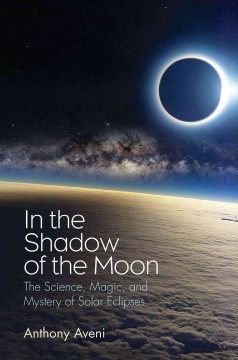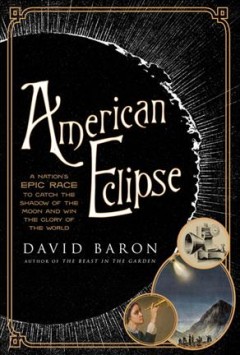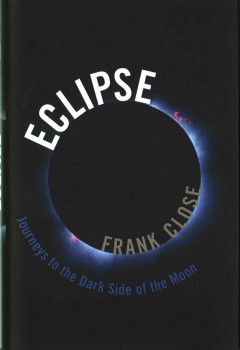Library book displays are a struggle. A real hassle, honestly. You want to make them interesting, highlight books in your collection that don’t go out enough, while at the same time having enough books to replace those that are checked out. You also need to have topics of interest. One of the great shocks of my working life was discovering that a display of new biographies on the first floor was the least popular display I’d ever done (in fifteen days not a single title moved and I had to switch it out early). In contrast, a display I did on the history of words and the English language on the second floor is currently the MOST popular display I’ve ever done. I honestly cannot keep those titles on the shelves. Good thing we have a million titles on the topic.
The best displays happen when you can tie them into some great big national event. An election, say, or national holiday. Or how about an astronomical event? Those only come once in a blue moon (pardon the pun) and are certainly worth seeking out.
Today, we celebrate the upcoming eclipse on August 21st. Put away those solar shades and exchange them for a pair of reading glasses. We’re gonna look at some recent titles you should really be seeing in conjunction with the upcoming event in the skies:
In the Shadow of the Moon: The Science, Magic, and Mystery of Solar Eclipses by Anthony Aveni

Astronomer and anthropologist Anthony Aveni explains the history and culture surrounding solar eclipses, from prehistoric Stonehenge, to Babylonian creation myths, to a confirmation of Einstein’s theory of general relativity, to a spectacle that left New Yorkers in the moon’s shadow, to future eclipses that will capture human imaginations … Aveni explains the science behind the phenomenon, tracks eclipses across the ancient world, and examines the roles of solar eclipses in modern times to reveal the profound effects these cosmic events have had on human history
American Eclipse: A Nation’s Epic Race to Catch the Shadow of the Moon and Win the Glory of the World by David Baron

On a scorching July afternoon in 1878, at the dawn of the Gilded Age, the moon’s shadow descended on the American West, darkening skies from Montana Territory to Texas. This rare celestial event–a total solar eclipse–offered a priceless opportunity to solve some of the solar system’s most enduring riddles, and it prompted a clutch of enterprising scientists to brave the wild frontier in a grueling race to the Rocky Mountains. Acclaimed science journalist David Baron, long fascinated by eclipses, re-creates this epic tale of ambition, failure, and glory in a narrative that reveals as much about the historical trajectory of a striving young nation as it does about those scant three minutes when the blue sky blackened and stars appeared in mid-afternoon.
Eclipse: Journeys to the Dark Side of the Moon by F.E. Close

Close explains why eclipses happen, reveals their role in history, literature, and myth, and focuses on eclipse chasers, who travel with ecstatic fervor to some of the most inaccessible places on the globe to be present at the moment of totality.
Mask of the Sun: The Science, History and Forgotten Lore of Eclipses by John Dvorak

What do Virginia Woolf, the rotation of hurricanes, Babylonian kings and Einstein’s General Theory Relativity all have in common? Eclipses. Always spectacular and, today, precisely predicable, eclipses have allowed us to know when the first Olympic games were played and, long before the first space probe, that the Moon was covered by dust.
In Mask of the Sun, acclaimed writer John Dvorak the importance of the number 177 and why the ancient Romans thought it was bad to have sexual intercourse during an eclipse (whereas other cultures thought it would be good luck). Even today, pregnant women in Mexico wear safety pins on their underwear during an eclipse. Eclipses are an amazing phenomena–unique to Earth–that have provided the key to much of what we now know and understand about the sun, our moon, gravity, and the workings of the universe.
He Said / She Said by Erin Kelly

In the summer of 1999, Kit and Laura travel to a festival in Cornwall to see a total eclipse of the sun. Kit is an eclipse chaser; Laura has never seen one before. Young and in love, they are certain this will be the first of many they’ll share. But in the hushed moments after the shadow passes, Laura interrupts a man and a woman. She knows that she saw something terrible. The man denies it. It is her word against his. The victim seems grateful. Months later, she turns up on their doorstep like a lonely stray. But as her gratitude takes a twisted turn, Laura begins to wonder–did she trust the wrong person? 15 years later, Kit and Laura are living under new names and completely off the digital grid: no Facebook, only rudimentary cell phones, not in any directories. But as the truth catches up to them, they realize they can no longer keep the past in the past.
The Return by Joseph Helmreich

During a live television broadcast on the night of a lunar eclipse, renowned astrophysicist Andrew Leland is suddenly lifted into the sky by a giant spacecraft and taken away for all to see. Six years later, he turns up, wandering in a South American desert, denying ever having been abducted and disappearing from the public eye…Meanwhile, he inspires legions of cultish devotees, including a young physics graduate student named Shawn Ferris who is obsessed with finding out what really happened to him. When Shawn finally tracks Leland down, he discovers that he’s been on the run for years, continuously hunted by a secret organization that has pursued him across multiple continents, determined to force him into revealing what he knows…Shawn soon joins Leland on the run. Though Leland is at first reluctant to reveal anything, Shawn will soon learn the truth about his abduction, the real reason for his return, and will find himself caught up in a global conspiracy that puts more than just one planet in danger.
